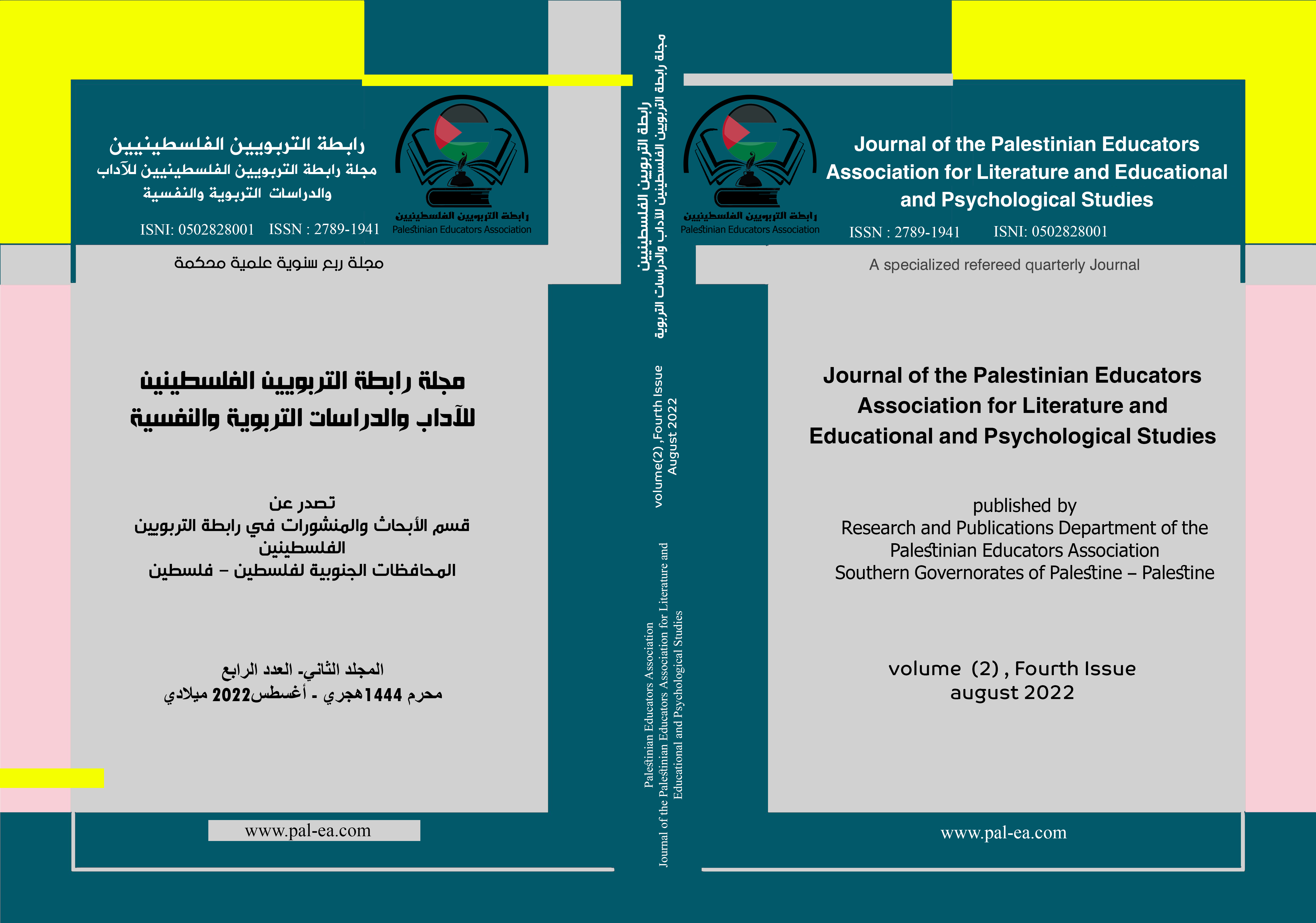"The role of educational leadership in developing an environment that supports talent and creativity"
DOI:
https://doi.org/10.69867/PEAJ043Keywords:
Critical thinking, creative thinking, higher-order thinking skills, educational leadership, an environment that supports creativity.Abstract
تتميز فلسفة التربية الحديثة بالتركيز على تعليم التفكير؛ التفكير الناقد، التفكير الإبداعي، وتفكير حل المشكلات، أي التفكير الذي يتطلب المهارات العقلية العليا. وقد أثبتت الدراسات أن الأطفال يولدون ولديهم قدرات إبداعية كامنة، وتظهر هذه القدرات في السنين الأولى من عمر الطفل في محاولاته الدائمة للاستكشاف، وطرحه الدائم للأسئلة. ومهارات التفكير العليا كالتفكير الإبداعي يلزمها البيئة المناسبة المساندة لكي تظهر وتنمو، ويتحمل مسؤولية ذلك الأسرة والروضة والمدرسة والمسئولون في المؤسسات التربوية التعليمية المختلفة. وتبين هذه الورقة أهمية دور القيادة التربوية في تطوير البيئة الداعمة للموهوبين والمبدعين في إطار المؤسسة التربوية، وتطرح نموذجا خاصاً لهذه القيادة التربوية، التي تشجع على الإبداع وتمتلك الخبرة في التخطيط ومتابعة التنفيذ، وكذلك تمتلك الصلاحيات، وتستثمر طاقات ومعارف العاملين فيها من أجل تحقيق أهدافها في تطوير البيئة الداعمة للموهوبين.
وإذا كان لا يمكننا تعليم التفكير لأنه مرتبط بالذكاء المرتبط بالجينات، فإننا نستطيع أن نعلم مهارات التفكير. ويعرف تعليم التفكير بأنه تزويد الطلبة بالفرص الملائمة لممارسة نشاطات التفكير في مستوياتها البسيطة والمعقدة، وحفزهم وإثارتهم على التفكير. وهي عملية كلية تتأثر بالمناخ الصفي والمدرسي وكفاءة المعلم وتوافر المصادر التعليمية المثيرة للتفكير.
Downloads
References
المصادر والمراجع
أولاً: المراجع العربية:
- جبر، أحمد ؛ وحجازي، حمزة. (1994). سيكولوجية الموهوب وتربيته. نابلس، فلسطين.
- جروان، فتحي. (2002). الإبداع. دار الفكر للطباعة والنشر، عمان، الأردن.
- جروان، فتحي. (1999). تعليم التفكير- مفاهيم وتطبيقات. دار الكتاب الجامعي، العين: الإمارات العربية المتحدة.
- درويش، كمال والحمامي محمد والمهندس، سهير ، (1996)، الإدارة الرياضية الأسس والتطبيقات، الهيئة المصرية العامة للكتاب.
- سعادة، جودت. (2003). تدريس مهارات التفكير. دار الشروق للنشر والتوزيع، عمان: الأردن.
- شقور، محمد. (2002). الإدارة المدرسية في عصر العولمة، ط3، دار المسيرة، عمان، الأردن.
-عطوي، جودت. (2014). الإدارة المدرسية الحديثة- مفاهيمها وتطبيقاتها العملية، دار الثقافة للنشر والتوزيع، عمان، الأردن.
- غانم، محمود. (2001). التفكير عند الأطفال_ تطوره وطرق تعليمه. دار الفكر، عمان: الأردن.
- الكوني، عصام. (2017). الإدارة المدرسية ودورها في تنمية الإبداع لدى المعلمين في مدارس التعليم الأساسي بليبيا. مجلة كليات التربية، ع7، 1-16.
- قطامي، يوسف. (1990). تفكير الأطفال- تطوره وطرق تعليمه. الأهلية للنشر والتوزيع، عمان، الأردن.
- قطامي، يوسف، وقطامي، نايفة. (2001). سيكولوجية التدريس. دار الشروق للنشر والتوزيع، عمان: الأردن.
-النعيمات، محمود. (2016). دور القيادة في تنمية الإبداع لدى معلمي مدارس المرحلة الثانوية في تربية قصبة عمان من وجهة نظر المعلمين. مؤتمر كلية التربية الرياضية الحادي عشر، الجامعة الأردنية.
المراجع العربية الإنجليزية
- Jabr, A.; Hegazy, H. (1994). The psychology of the gifted and his upbringing. (in Arabic), Nablus, Palestine.
Jarwan, F. (2002). creativity. Dar Al-Fikr for printing and publishing, Amman, Jordan.
Jarwan, F. (1999). Teaching thinking - concepts and applications. (in Arabic), University Book House, Al Ain: United Arab Emirates.
- Darwish, K, Al-Hamamy, M, and Al-Mohandes, S, (1996), Sports Management, Principles and Applications, (in Arabic), the Egyptian General Book Authority.
- His Excellency, c. (2003). Teaching thinking skills. (in Arabic), Dar Al-Shorouk for Publishing and Distribution, Amman: Jordan.
Shaqur, M. (2002). School Administration in the Age of Globalization, (in Arabic), 3rd Edition, Dar Al Masirah, Amman, Jordan.
Atwi, J. (2014). Modern School Administration - Concepts and Practical Applications, (in Arabic), Dar Al Thaqafa for Publishing and Distribution, Amman, Jordan.
- Ghanem, M. (2001). Children's thinking - its development and teaching methods. (in Arabic), Dar Al-Fikr, Amman: Jordan.
Al-Koni, p. (2017). School management and its role in developing creativity among teachers in basic education schools in Libya. (in Arabic), Colleges of Education Journal, p. 7, 1-16.
Qatami, Y. (1990). Children's thinking - its development and teaching methods. (in Arabic), Al-Ahlia for Publishing and Distribution, Amman, Jordan.
Qatami, J, and Qatami, N. (2001). Teaching psychology. (in Arabic), Dar Al Shorouk for Publishing and Distribution, Amman: Jordan.
- Alnaimat, M. (2016). The role of leadership in developing creativity among secondary school teachers in Qasaba Amman Education from the teachers' point of view. (in Arabic), the Eleventh Conference of the Faculty of Physical Education, University of Jordan.
المراجع الأجنبية:
- De Bono, Edward. (1994). De Bono's Thinking Course. MTCA Management, New York, USA.
-Fisher, Robert. (2001). Teaching Children to Think. Nelson Thorns Ltd. United Kingdom.
- Leithwood, Kenneth et. al. (2004). How Leadership Influences Student Learning. University of Minnesota. U.S.A.
-Renzulli,J., et.al. (1976). Scales for Rating the behavioral characteristics of superior students. Mansfield Center, CT: Creative Learning Press.
Downloads
Published
Issue
Section
License

This work is licensed under a Creative Commons Attribution-NonCommercial-ShareAlike 4.0 International License.
The Journal of the Palestinian Educators Association for Literature, Educational and Psychological Studies
E-issn: 2789-1941
Authors retain Copyright
The Journal of the Palestinian Educators Association for Literature, Educational and Psychological Studies allows Authors retain Copyright and grant the journal right of first publication with the work simultaneously licensed under a Creative Commons Attribution (CC-BY) 4.0 License that allows others to share the work with an acknowledgment of the work’s authorship and initial publication in this journal.
Provided they are the owners of the Copyright to their work, authors are able to enter into separate, additional contractual arrangements for the non-exclusive distribution of the journal’s published version of the work (e.g., post it to an institutional repository, in a journal or publish it in a book), with an acknowledgment of its initial publication in this journal.
Authors are permitted and encouraged to post their work online (e.g., in institutional repositories, disciplinary repositories, or on their website) prior to
and during the submission process.










